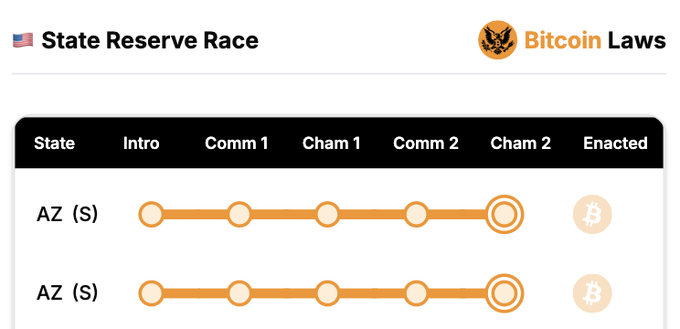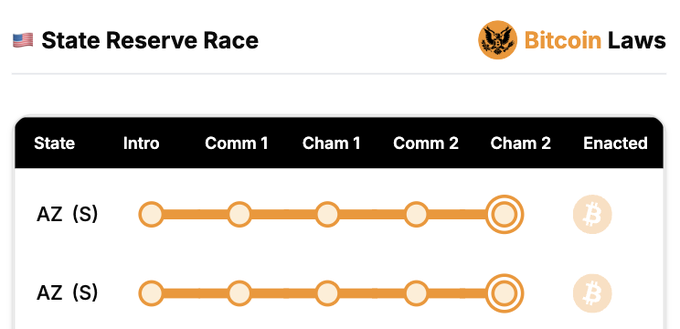
Arizona is taking significant steps towards building a state-level crypto assets reserve.
On 24 March, two key bills—Senate Bill 1373 and Senate Bill 1025—cleared the House Rules Committee.
If passed, the legislation would empower the state to create digital asset reserves using both seized cryptocurrencies and allocated public funds.
🇺🇸 State Reserve Race Update: Arizona’s House Rules Committee passed both Bitcoin Reserve Bills (SB1373 and SB1025), ruling them “constitutional and in proper form.” The bills have now passed their assigned committees, meaning they should be headed for a full floor vote.
With a Republican majority in the state House, the proposals now face a crucial floor vote that could place Arizona among the first US states to formally integrate crypto into treasury and retirement operations.
Bitcoin, crypto bills move forward
Senate Bill 1373, known as the Strategic Digital Assets Reserve Bill, proposes the creation of a fund comprised of digital assets seized during criminal proceedings.
The bill designates the Arizona State Treasurer as the fund’s manager, with oversight ensuring controlled exposure to market volatility.
It includes a cap of 10% on the amount of the reserve that can be invested each year.
It also allows the state to lend digital assets under the condition that such activity does not increase financial risk.
This framework aims to turn previously confiscated assets into productive reserves without speculative exposure.
Senate Bill 1025, named the Arizona Strategic Bitcoin Reserve Act, focuses exclusively on Bitcoin.
The bill would allow the state treasury and retirement system to allocate up to 10% of available funds into Bitcoin.
It also includes a provision requiring the Bitcoin to be stored in a secure, segregated Federal Reserve account.
JUST IN: 🇺🇲 Arizona’s House Rules Committee passed both Bitcoin Reserve Bills (SB1373 and SB1025), ruling them “constitutional and in proper form.” 👏 The bills have now passed their assigned committees, meaning they should be headed for a full floor vote.
Political risks remain
The two proposals will now head to the state House floor for a final vote. Arizona’s lower chamber has a 33-27 Republican majority, potentially easing the passage of the bills.
However, even with legislative support, Governor Katie Hobbs’ stance remains uncertain.
Governor Hobbs, a Democrat, has vetoed 22% of the bills passed in 2024 so far—the highest rate of any US governor this year.
Her approach to cryptocurrency-related legislation has not been publicly clarified, adding uncertainty to the future of the proposed crypto reserve.
The approval of either or both bills would mark a shift in Arizona’s approach to fiscal diversification.
By incorporating crypto assets, the state aims to supplement its traditional financial reserves while also experimenting with blockchain-based monetary strategies.
Other states expand Bitcoin reserve plans
Arizona is not alone in this shift. A wave of similar proposals is emerging across the US, reflecting broader interest in digital assets among state governments.
In Texas, the Senate passed its own version of a Bitcoin reserve bill (SB-21) with a 25-5 vote.
That legislation awaits a House vote and gubernatorial decision. In a related move, Representative Ron Reynolds has proposed a cap of $250 million for the reserve.
Meanwhile, Oklahoma’s House passed Bitcoin Reserve Bill HB1203 with a 77-15 vote on 25 March, sending it to the state Senate.
Utah also introduced legislation along similar lines, although the section calling for a strategic reserve was eventually removed before advancing further.
By allocating small portions of their treasuries or seized assets into cryptocurrencies, state governments are exploring new methods of value preservation, hedging, and returns.
If the bills become law, Arizona will set a precedent for managing public digital assets through a conservative, regulated framework. The 10% allocation cap in both proposals reflects an attempt to balance innovation with fiscal responsibility.
The post Arizona advances Bitcoin and crypto reserve strategy with two bills appeared first on Invezz

















 English (US) ·
English (US) ·